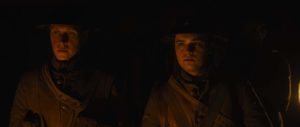There is a moment during Sam Mendes’ masterpiece of a film, 1917, where a character is permitted to remove himself from the overwhelming, unrelenting now, and process both the facts of what he’s been through and the conjecture about what he’s about to face. During this moment, George MacKay, playing the appropriately named Will, gives one of the finest performances ever caught on film (or its digital counterpart). As soldiers around him make fun of their commanding officer and of each other in the blithe and hearty way that people do when death is lurking over their shoulders, MacKay, in a wordless sequence shows us how Will is remembering what has happened to him in the last few hours. Those hours include the litany of horrors that fighting the trench warfare World War I involved, not the least of which is a half-rotting corpse hanging from the barbed-wire of the no man’s land between the German and British trenches who has been dubbed by an officer with the black humor of the front as “the bowing man.” As with so much of the film, words are not necessary. MacKay and the film transcend the need for them.
Mendes uses the illusion of one single take to tell this story of a desperate mission by two British corporals to stop a brigade from charging into a carefully planned slaughter. It’s a seamless process, but never a gimicky one. The effect of following Will and his friend, Blake (Dean-Charles Chapman), resting under a tree in a picturesque meadow, through the claustrophobia and tedium of the trenches themselves, the blasted landscape of the no man’s land, and then behind the German lines full of despoiled farms and lurking snipers creates an immersive experience and an immediacy that heightens their journey. The deceptive small talk as they trudge on is a précis on the cost of war on the psyche, reflected in the scorched earth around them, and the uncertainty of what the next split-second will bring. It also heightens the class divide between the regular army and the officers, all with posh accents, that think of the non-commissioned soldiers in strategic terms, if they think very much of them at all as they plan their maneuvers. It might be the stress of three years of battle for inches of ground gained and lost at the cost of so many lives, or it might be the social conditioning. It might be both.

George MacKay, Dean-Charles Chapman
This is where Mendes elevates his tension-charged film into a consideration of human nature as a whole, including why men are willing to run into a barrage of bullets and almost certain death. He’s structured it with deliberate import, starting from that moment of bucolic serenity, and sending his messengers through increasingly failing light, sent off with a mock liturgical blessing and sprinkled with liquor from an officer (Andrew Scott) shell-shocked into emotional shutdown, and eventually plunging the action into the black of night as a village burns with infernal fire, and demons in the form of enemy soldiers stalk half-seen in the dark. The following immersion into a river is a baptism into a different life, at least a different world view, until the final meeting with god almighty in the person of an officer (Benedict Cumberbatch) who literally holds life and death in his hands. It may be subtext, but subsumed with a deft skill that refuses to let allegory make the tension any less than visceral, provoking the triggers of our deepest subconscious fears.
As in that ci-mentioned quiet moment, it is the very wordlessness of 1917 that carries its power. Two young men trying to make sense of insanity, and maintaining their humanity in the definition of nihilism, is about more than this particular fictionalized incident from The Great War. It is a stunning and savage existential exercise, and a thing of overwhelming poetic beauty.
If only the film industries could turn out more gripping and thought-provoking film projects instead of the constant inundating swill imposed on moviegoers.
Brilliantly made and at last a WW1 film which truly depicts the horror of that war.
I found the link between this war and the lessons of the Civil War particularly interesting, showing the “advancement” of Trench warfare.
A VISCERAL UNDERSTANDING SHARED BY EVERY SOLDIER.